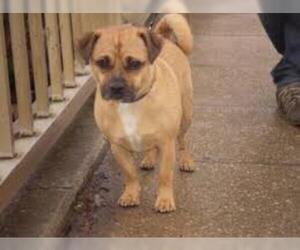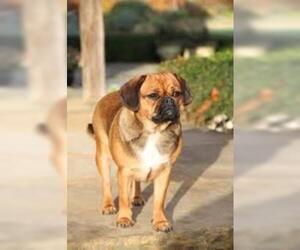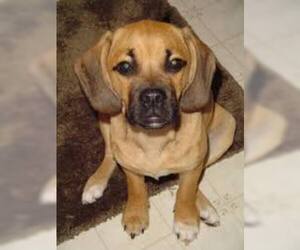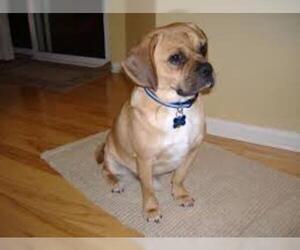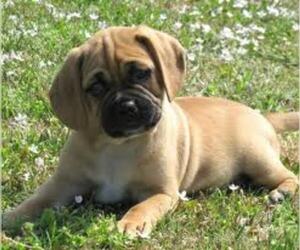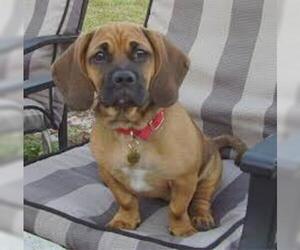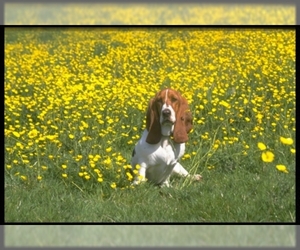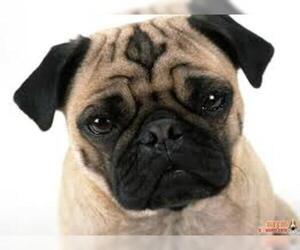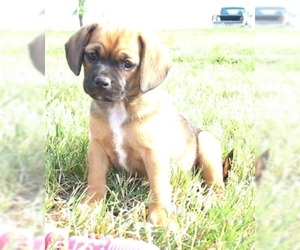
All about Bassugg dog breed
A.K.A. :Pugset, Bagel, Bassug, Bassug Pug, Pug Basset, Basset Pug, Bassuggle, Buggle Hound
Bassugg is a mix of
Size
Grooming requirements
Exercise requirements
Good with other dogs
Watchdog ability
Energetic
Training requirements
Playful
Affectionate
Good with other pets
Good with children
Good with strangers
Winter
Summer
Healthiness
Protective
Life Span
| Mixed Breeds | Member |
| Breeds A - Z | B |
| Breeds by Group | Hunting Non-Sporting |
| Breeds by Trait | Good With Kids Low Shedding |
| Overview: | The delightful Bassugg, a charming crossbreed between the affable Basset Hound and the comical Pug, offers a unique blend of traits. Originating from designer breeding efforts, this medium-sized companion typically inherits a sturdy, low-slung body, often with a Pug's wrinkly face and the Basset's long, droopy ears. Their short, easy-care coat can vary in color, reflecting either parent. Temperamentally, Bassuggs are known for being affectionate, laid-back, and incredibly loyal, making them excellent family pets that thrive on companionship. Their moderate exercise needs make them surprisingly suitable for apartment living, provided they receive daily walks and mental stimulation. While generally healthy, potential owners should be aware of predispositions to respiratory issues common in Pugs (due to brachycephaly) and joint problems often seen in Bassets, making responsible breeding and regular vet check-ups crucial. |
F.A.Q.
All You Need to Know About the "Bassugg" Breed (parent breeds: "Basset Hound" × "Pug")
The Bassugg, a delightful mix of Basset Hound and Pug, combines the best traits of both parent breeds. Originating from designer breed crosses, this charming hybrid dog typically boasts a friendly, affectionate, and sometimes comical temperament, making them fantastic family pets. Physically, Bassuggs often inherit the Basset Hound's long, low body and expressive eyes, paired with the Pug's wrinkly face and curled tail. Their short, easy-care coat requires minimal grooming—weekly brushing usually suffices. They are well-suited for apartment living due to their moderate exercise needs, enjoying short daily walks and indoor play. While generally healthy, potential health considerations include joint issues (like patellar luxation) and breathing difficulties, common in brachycephalic breeds. A truly unique and loving companion, the Bassugg offers a wonderful blend of loyalty and low-key charm for various households.The Bassugg weight typically ranges from 15 to 30 pounds for a healthy adult. On average, you can expect your Bassugg to be around 20-25 pounds. While there isn't a significant weight difference between male and female Bassuggs, males may sometimes be slightly heavier. This average size makes the Bassugg a compact and manageable companion. Always aim for a healthy weight for Bassugg through proper diet and exercise to prevent obesity.
Wondering about the Bassugg height and average size? As a delightful cross between a Basset Hound and a Pug, the Bassugg inherits a unique blend of characteristics, including its stature. Understanding "how tall is a Bassugg" is key when considering this charming hybrid.
The average height of a Bassugg typically falls within a range of 10 to 14 inches when measured at the shoulder (withers). This measurement reflects the typical adult size once they've reached full maturity, usually around 12-18 months of age.It's important to note that, as with all hybrid breeds, there can be some variation in size due to the genetic lottery. Some Bassuggs may lean more towards the shorter, stockier build of a Pug, while others might inherit more of the Basset Hound's slightly longer legs and overall frame, pushing them towards the higher end of the range. Generally, there isn't a significant height difference between male and female Bassuggs, though individual males might be marginally taller or heavier than females. Individual genetics and the specific traits inherited from each parent play a large role in determining the final adult dimensions. When looking for your Bassugg, remember that while these ranges are a helpful guide, each dog is unique!The Bassugg breed, a charming mix of Basset Hound and Pug, exhibits a delightful range of coat colors. Common Bassugg colors often reflect those of their parent breeds, including fawn, black, and apricot. You may also find Bassuggs in sable, cream, and various shades of tan or brown. Rare Bassugg colors and exotic variations, though not officially recognized by major kennel clubs like the AKC for this specific crossbreed, can sometimes appear due to recessive genes from either parent, or even other breeds in the lineage. These exotic Bassugg variations might include brindle, which is a striped pattern, or even shades like blue (a dilute black) or chocolate. It's important to note that colors such as blue Bassugg, lilac Bassugg, or merle Bassugg are extremely uncommon and generally not part of the standard color palette for either Basset Hounds or Pugs, therefore they are not AKC recognized Bassugg colors as the Bassugg is not an AKC-recognized breed itself. When considering Bassugg coat types, buyers should expect to see the more traditional fawn, black, and tan shades, with rare colors potentially influencing pricing due to their uniqueness. Always inquire about the parentage for a better understanding of potential coat colors.
The Bassugg personality is a delightful blend of its parent breeds, resulting in a charming and adaptable companion. Expect a generally friendly and affectionate dog, often displaying the Pug's desire for closeness and the Basset Hound's easygoing nature. They are typically very loyal to their families, enjoying being part of all household activities. Their moderate energy levels and compact size make them highly adaptable to apartment living, provided they receive regular short walks and mental stimulation. Bassuggs tend to be quite sociable, usually getting along well with children and other pets, especially if introduced early and socialized properly. While generally good with kids, supervision is always recommended due to their smaller size. Their playful yet relaxed demeanor makes them excellent companions for a variety of households seeking a devoted and good-natured canine friend. The temperament of Bassugg makes them an ideal choice for first-time dog owners and families alike.
The Bassugg temperament is a delightful blend, often combining the Basset Hound's laid-back charm with the Pug's playful affection. These companion dogs are typically very friendly and sociable, forming strong bonds with their families. They are generally loyal and adaptable, making them excellent apartment living dogs due to their moderate exercise needs and tendency to enjoy indoor comfort.
Bassuggs are usually good with children, especially when properly socialized, often displaying a patient and tolerant nature. They can also get along well with other pets, though early introductions are always recommended. While generally eager to please, the Bassugg can inherit a touch of the Basset Hound's independent streak, leading to occasional stubbornness during training. They may also exhibit a sensitive side, reacting better to positive reinforcement than harsh corrections. Overall, the Bassugg is known for its affectionate, easygoing, and charming personality traits, making them wonderful family additions.Bassugg Care: Your Guide to a Happy, Healthy CompanionCaring for a Bassugg, a charming Basset Hound-Pug mix, involves understanding the unique needs inherited from both parent breeds. Here's what potential adopters need to know for optimal Bassugg care:Grooming Needs: Bassuggs typically have short, dense coats that require minimal grooming. Weekly brushing with a rubber curry brush or a shedding blade will help remove loose hair and keep their coat healthy. Occasional baths, especially if they've been exploring outdoors, are sufficient. Focus on keeping their skin folds clean to prevent irritation.Exercise Limitations: Bassuggs are generally a low-energy dog breed. While they enjoy short, daily walks (20-30 minutes) and playtime in a secure yard, they are not built for strenuous exercise. Over-exertion, especially in warm weather, should be avoided due to their brachycephalic (short-nosed) anatomy. Leash walks are crucial, as their Basset Hound heritage can lead to a strong scent drive.Dietary Considerations: Dietary considerations for a Bassugg should focus on a high-quality, age-appropriate dog food. They are prone to weight gain, so portion control and monitoring calorie intake are essential for weight management. Consult your veterinarian for specific recommendations based on their activity level and individual needs. Avoid overfeeding treats.Wrinkle and Ear Cleaning: Due to their Pug and Basset Hound lineage, wrinkle and ear cleaning are critical daily maintenance tasks. Their facial wrinkles and deep ear canals can trap moisture and debris, leading to infections. Gently clean wrinkles with a damp cloth or pet-specific wipes daily, ensuring they are thoroughly dried afterward. Check and clean ears weekly with a veterinarian-approved ear cleaner.Climate Sensitivity: Bassuggs are sensitive to extreme temperatures. Their brachycephalic anatomy makes them prone to overheating in warm or humid climates. Always provide access to shade and fresh water, and avoid exercise during the hottest parts of the day. In cold weather, ensure they have adequate shelter and consider a coat for outdoor excursions. This climate sensitivity is a key aspect of how to care for a Bassugg.Common Health Concerns & Health Tips for Bassugg: Be aware of common health concerns such as skin issues (dermatitis in wrinkles), dental problems (overcrowding, gum disease), and joint issues (due to their longer backs). Regular veterinary check-ups are vital for early detection and prevention. Maintain excellent dental care through brushing and professional cleanings. Weight management is paramount to prevent strain on their joints and overall health. With proper Bassugg care and attention to these details, your Bassugg can live a long, happy life.
The Bassugg activity level is generally moderate, balancing short bursts of playful energy with significant periods of rest, much like their parent breeds. They are not high-stamina dogs, making them suitable for both low-energy households and those who enjoy casual walks.
How active are Bassugg? They typically enjoy a daily walk of 20-30 minutes, broken into two shorter sessions if preferred. This helps maintain a healthy weight and satisfies their curiosity. Beyond walks, Bassuggs love indoor playtime with toys, especially those that engage their strong sense of smell, inherited from the Basset Hound. Tug-of-war or short games of fetch are often met with enthusiasm, but don't expect them to go on long hikes or runs.Due to their brachycephalic (short-nosed) anatomy, inherited from the Pug, Bassuggs can be prone to overheating and respiratory difficulties, especially in warm weather or during strenuous exercise. It's crucial to monitor them carefully during activity and avoid overexertion. Always provide access to fresh water and opt for cooler times of day for walks. Their shorter legs also limit their endurance, so while they may have a burst of speed, it's usually short-lived.In summary, Bassugg exercise needs are manageable. They thrive on a consistent routine of moderate activity and plenty of cuddle time. They are not ideal for highly active families seeking a jogging or hiking partner, but they are a wonderful companion for those who appreciate a playful, yet ultimately relaxed, canine friend.Because the Pug parent is a brachycephalic breed, many Bassuggs inherit a shortened muzzle, making them prone to Brachycephalic Obstructive Airway Syndrome (BOAS). Applying brachycephalic dog care strategies—such as avoiding strenuous activity in hot weather, using a harness instead of a collar, and monitoring breathing during exercise—can help reduce respiratory stress. Their compact, heavyset build also contributes to heat sensitivity, so they should always have access to shade, water, and cool resting areas.
Understanding how to keep Bassugg healthy involves scheduling regular veterinary checkups, early screening for joint, respiratory, and spinal conditions, maintaining a balanced diet to prevent obesity, and providing moderate but consistent exercise. Grooming routines should include cleaning skin folds, brushing to reduce shedding, and dental care to prevent oral disease. With attentive care, Bassuggs can enjoy a loving, playful life of 10–13 years.
Breed Breakdown: What Experts Say About the Bassugg
I would rate the "Size" trait of the "Bassugg" breed as a 3.This rating reflects the Bassugg's likely small to medium-small stature, falling comfortably within the "small dog" category. As a hybrid of the Basset Hound and the Pug, the Bassugg inherits genes from two breeds that are not large by any stretch. The Pug is a quintessential compact breed, known for its sturdy but diminutive frame, typically weighing 14-18 pounds and standing around 10-14 inches tall. While the Basset Hound has a longer body and can be heavier (40-65 pounds), its short legs mean its overall height at the shoulder is still relatively low, usually 11-15 inches.Given this genetic combination, a Bassugg would likely be a low-slung, relatively compact dog. It might have a longer body than a purebred Pug but would almost certainly be significantly shorter and lighter than even the lower end of the Basset Hound weight range, especially if it takes more after the Pug in build. We can expect a Bassugg to generally weigh somewhere between 15-35 pounds and stand around 10-15 inches tall. This size makes the Bassugg very well-suited for apartment living, as they don't require vast amounts of space to move around. Their portability also makes them excellent companions for travel, easily fitting into carriers or adapting to smaller hotel rooms. They are ideal for households with space constraints where a larger dog would feel cramped, and their moderate exercise needs further reinforce their suitability for such environments.
The Bassugg breed, inheriting traits from both the Basset Hound and the Pug, would likely rate a 7 on the grooming requirements scale. This places them in the moderately high-maintenance category, requiring more frequent and specialized care than many other companion dogs.Their double parentage leads to a mixed bag of grooming challenges. From the Basset Hound, they likely inherit a short, dense coat that sheds moderately, requiring regular brushing to manage loose hair. However, the Basset's famously long, droopy ears are a major contributor to their higher maintenance, demanding frequent cleaning to prevent infections due to poor air circulation. The Pug parentage, on the other hand, introduces the significant concern of skin folds. These charming wrinkles are notorious for trapping moisture, dirt, and bacteria, necessitating daily cleaning and thorough drying to prevent skin infections and irritation. Both breeds are prone to environmental allergies, which can manifest as skin issues and require dedicated care. Nail trimming will be a standard, regular requirement for both, as will routine dental care. While their short coat means less extensive bathing than long-haired breeds, attention to skin folds and ear hygiene makes bathing a more involved process. Therefore, while not requiring daily professional grooming, the combination of ear care, skin fold maintenance, and potential allergy management pushes the Bassugg into a realm of consistent, detailed home grooming.
I'd rate the Bassugg's "Exercise Requirements" a 4 out of 10.While inheriting some of the Pug's brachycephalic limitations and the Basset Hound's laid-back demeanor, the Bassugg isn't a complete couch potato. Their smaller stature and potential for the Pug's more animated energy prevent them from having truly minimal needs. They thrive on daily, moderate walks, typically one or two 20-30 minute outings, rather than extensive runs. Playtime in a secure yard is also highly beneficial for mental stimulation and burning off pent-up energy. Their short snout from the Pug parent means they can overheat easily and are not suited for strenuous or prolonged exercise, especially in warm weather. Similarly, the Basset's long back makes high-impact activities like agility less ideal. They generally enjoy sniffing around on walks and a good play session with toys, but they aren't dogs that demand rigorous, structured routines to stay healthy or prevent destructive behaviors. They are generally content with a moderate amount of activity, balancing periods of playful energy with extended naps.
I'd rate the "Bassugg's" watchdog ability at a 6 out of 10.While inheriting the Basset Hound's relaxed demeanor and the Pug's friendly disposition, the Bassugg would likely possess a surprisingly effective "early warning system" rather than being a true deterrent. Their alertness, particularly to new sounds, would likely be quite good, a trait often seen in both parent breeds. The Basset's baying instinct, combined with the Pug's tendency for yappy barks, suggests a fairly vocal response to anything perceived as unusual. They would definitely alert their owners to someone at the door or an unexpected noise in the yard. Their territorial instincts would probably lean more towards "alerting" rather than "aggressively defending," meaning they'd be quick to bark at unfamiliar people approaching the home. However, their willingness to actually deter an intruder would be limited. They're more likely to be curious or even friendly once an individual is inside, rather than actively aggressive. Therefore, while excellent at providing meaningful early warnings, they are less of a robust protective force and more of a vocal companion who will definitely let you know when something is amiss.
Rating: 7/10The Bassugg, inheriting traits from both the Basset Hound and the Pug, generally possesses a good-natured and relatively sociable disposition towards other dogs. The Basset Hound's laid-back and pack-oriented nature often translates into a dog that enjoys canine company and is usually tolerant of other dogs. Pugs, while sometimes possessing a "big dog in a small body" attitude, are typically friendly and eager to play. This combination usually results in a dog that is adaptable in multi-dog households and can comfortably coexist with dogs of varying sizes and energy levels, especially if introduced properly.However, the "7" rather than a higher score accounts for a few nuances. Pugs can sometimes exhibit a touch of possessiveness or a desire to be the center of attention, which might manifest as a slight reluctance to share toys or human affection with other dogs if not properly socialized. Similarly, the Basset Hound's independent streak and focus on scent can sometimes make them less immediately engaged with other dogs in certain situations, though not in an aggressive way. While generally not prone to aggression or dominance, individual temperament and early socialization play a significant role. A Bassugg that receives consistent positive exposure to other dogs from a young age is likely to be extremely sociable. Without proper socialization, they might be a bit more reserved or require careful introductions, but they rarely exhibit outright incompatibility. Therefore, they generally thrive in canine company, though careful introductions and continued positive interactions are always beneficial to ensure peaceful coexistence.
I would rate the "Energetic" trait of the "Bassugg" breed a 4 out of 10.The Bassugg, being a mix of Basset Hound and Pug, generally inherits a more laid-back and companionable disposition rather than an intensely active one. Both parent breeds are known for their love of comfort and relatively lower exercise requirements. The Basset Hound, while having surprising endurance for a scent trail, is primarily a methodical mover, not a sprinter, and is perfectly content lounging. The Pug is decidedly a lap dog, built for short bursts of play followed by extensive naps.Therefore, the Bassugg will likely be playful in short bursts and enjoy a good walk, but won't be a candidate for high-intensity or prolonged athletic activities. Their need for physical stimulation will be moderate; daily walks and some indoor play will generally suffice. They are more naturally inclined to be a relaxed companion than an adventure buddy.A significant factor contributing to this lower rating is the potential for brachycephalic anatomy inherited from the Pug. While not all Bassuggs will have severe brachycephaly, any degree of a flattened face can significantly impact stamina and exercise tolerance. This anatomical feature can make breathing difficult during exertion, leading to overheating and respiratory distress. Consequently, even if a Bassugg had a higher desire to play, their physical limitations due to potential brachycephaly would likely prevent sustained high-energy activities, making them prone to resting after only moderate exertion. This physiological constraint further cements their position on the lower end of the energy spectrum compared to other companion dogs.
I'd rate the "Training Requirements" of the "Bassugg" at a 6. This places them in the moderately challenging category. The Bassugg inherits a fascinating blend of traits from its Basset Hound and Pug parents, and training will reflect this.From the Basset Hound side, you're likely to see a good dose of independent thinking and a well-developed sense of smell that can easily distract them. They can be famously stubborn, and if they don't see the immediate benefit of a command, they might just ignore it. This contributes to a lower responsiveness to commands compared to highly biddable breeds. Their attention span, especially outdoors, can be quite short when a captivating scent is nearby.The Pug influence brings a desire for human attention and a generally more eager-to-please nature than the Basset, which is a big plus. They are intelligent enough to understand what you want, but their short snouts can sometimes make them a bit wheezy, potentially affecting their willingness for prolonged physical activity during training sessions. Pugs can also be a bit dramatic, and if they're not enjoying themselves, they might just flop down!For a Bassugg, positive reinforcement is absolutely critical and highly effective; harsh methods will likely lead to a shut-down or increased stubbornness. Consistency is paramount. You can't expect a Bassugg to learn a command if you're not consistent in your expectations and follow-through. Short, fun, and frequent training sessions are best to maintain their interest and work with their potential for a shorter attention span.While not entirely beginner-unfriendly, a Bassugg is definitely not a "plug-and-play" dog for first-time owners without research and commitment. They will benefit greatly from an owner who is patient, persistent, and has a good sense of humor. They require structured routines to help them understand boundaries and expectations, but the owner also needs to be adaptable and understand that sometimes, the Bassugg will simply be a Bassugg. An experienced handler will likely find them a rewarding challenge, but a novice owner can certainly succeed with dedication and perhaps some professional guidance.
I'd rate the Bassugg's "Playful" trait a 7 out of 10.The Bassugg, inheriting traits from both the Basset Hound and the Pug, is likely to be a moderately playful companion. While they won't typically possess the boundless, non-stop energy of a terrier or a retriever, they certainly aren't a breed content to simply lay around all day. The Pug's often comical antics and desire for interaction will infuse a playful spirit, manifesting in silly zoomies, a love for chasing toys, and a general enthusiasm for engaging with their family. They'll likely be very responsive to playtime and enjoy a good game of fetch or tug-of-war, often initiating play with a nudge or a playful bark. However, the Basset Hound's more laid-back nature and scent-driven curiosity will temper this, meaning they will also be content with periods of relaxation, especially after a good walk or play session. They are less likely to be "bouncing off the walls" constantly but will readily join in the fun and seek attention through affectionate and sometimes clownish behavior. They're more spirited than a truly sedentary breed but not overwhelmingly energetic compared to some of the more high-drive companion dogs.
I'd rate the "Affectionate" trait of the Bassugg as a 9 out of 10. This breed would likely be extremely loving and people-oriented, inheriting a strong desire for human companionship from both its Basset Hound and Pug parents. Bassuggs would thrive on physical closeness, with a high propensity for cuddling, lap-sitting, and generally being in close proximity to their owners. Their loyalty would be unwavering, and they would likely be quite sensitive to owner emotions, often seeking to comfort or engage when they sense a shift in mood. Expect a Bassugg to be a constant shadow, happily following family members from room to room. While no dog is entirely without an independent streak, the Bassugg would be far more likely to be a devoted companion that genuinely thrives on affection and feels most secure and content when actively participating in family life, rather than being an independent observer.
I'd rate the "Good with Other Pets" trait of the "Bassugg" breed a 7 out of 10.The Bassugg, inheriting traits from both the Basset Hound and the Pug, generally leans towards a more amiable disposition, making them fairly good companions for other animals. Pugs are renowned for their friendly and adaptable nature, often getting along well with other dogs and even cats. Basset Hounds, while possessing a scent hound's prey drive, are typically placid and tolerant in a home environment.The blend often results in a dog that is generally sociable and lacks the intense prey drive of some more traditional hunting breeds, meaning they're less likely to view smaller pets as targets. Resource guarding, while always a possibility in any individual dog, isn't inherently a defining characteristic of either parent breed to an extreme degree.However, the "7" rather than a higher score acknowledges a few nuances. The Basset Hound's legacy includes a certain level of prey drive, and while often dormant in a domestic setting, it could manifest with smaller, faster-moving animals, especially if not properly socialized. Additionally, the stubbornness sometimes present in Bassets might require consistent training to ensure they understand and respect other pets' boundaries. While generally good-natured, supervision during initial introductions and ongoing reinforcement of positive interactions would be beneficial, especially with very small or timid pets, to ensure peaceful coexistence. They are generally naturally sociable, but training and supervision are still valuable to truly maximize their potential for harmony in a multi-pet household.
The Bassugg, a charming mix of Basset Hound and Pug, rates a solid 8 out of 10 for "Good with Children." This breed generally inherits a delightful combination of its parent breeds' best traits, making them quite suitable for families. Both Basset Hounds and Pugs are known for their amiable and gentle dispositions. Bassuggs tend to be patient and tolerant, qualities that are essential when interacting with children, especially younger ones who may be less refined in their handling. Their playful nature, inherited from both sides, means they enjoy engaging in gentle games and will likely be a fun, yet not overly boisterous, companion for kids. They also tend to be quite affectionate, often seeking out cuddles and attention, which can foster a strong bond with family members, including children. While they are generally good-natured, like any dog, early socialization and consistent, positive reinforcement training are beneficial to ensure they are well-adjusted. Supervision is always recommended when children and dogs are together, regardless of breed, to teach both how to interact respectfully. However, the Bassugg’s inherent sweetness and adaptability mean they are naturally gentle and affectionate, making them a wonderful, relatively low-maintenance companion for a family with children.
Rating the "Good with Strangers" trait of the "Bassugg" breed (Basset Hound × Pug): 7The Bassugg, inheriting traits from both the Basset Hound and the Pug, tends to be quite amiable with strangers, earning a solid 7. Both parent breeds are generally known for their friendly dispositions rather than being aloof or aggressive. The Basset Hound's easygoing nature and the Pug's charming, people-oriented personality typically combine to produce a dog that is initially curious and, after a brief assessment, quite welcoming to new people. They are not typically prone to excessive barking or guarding behavior towards unfamiliar adults, preferring to greet with a wagging tail and a sniff. While they might show a moment of reserved observation before approaching, they usually warm up quickly, especially if offered a friendly hand or a kind word. Their adaptability in public or guest-filled environments is generally good, as long as they have been adequately socialized as puppies. While they are naturally outgoing, early exposure to various people and settings will further reinforce their comfort and confidence, ensuring they remain sociable and welcoming rather than becoming overly timid.
I would rate the "Winter" tolerance of the "Bassugg" breed a 3 out of 10.While the Basset Hound parent might offer a *modicum* of insulation due to its heavier bone structure and slightly thicker skin, the dominant influence of the Pug in this cross heavily skews the Bassugg towards cold sensitivity. Pugs are notoriously ill-equipped for cold weather, and a Bassugg would inherit many of these vulnerabilities. Their coat is likely to be short and single-layered, offering very little protection against cold temperatures, and their relatively small size means they lose body heat quickly. The brachycephalic (short-nosed) anatomy inherited from the Pug makes them inefficient at warming inhaled air, leading to a higher risk of respiratory issues and making them uncomfortable in crisp, cold air. Furthermore, while they might carry some body fat, it's not enough to compensate for a lack of insulating fur in truly cold conditions, making them highly susceptible to hypothermia. They would be unable to safely enjoy prolonged outdoor activity in cold climates without significant protection.Compared to other companion dogs, the Bassugg would absolutely require special care during winter months. They would need a warm, indoor environment with limited exposure to the outdoors. Even for brief potty breaks, a well-insulated coat or sweater and booties would be essential. Owners would need to be vigilant for signs of discomfort or hypothermia and avoid any extended time outside when temperatures drop significantly.
The Bassugg, being a cross between a Basset Hound and a Pug, would likely rate around a 3 for "Summer" tolerance. This low rating is primarily due to the influence of the Pug parent. Both parent breeds contribute to a lower heat tolerance, but the Pug's brachycephalic (short-nosed) anatomy is a significant concern. Dogs with this facial structure have compressed airways, making it difficult for them to pant effectively and regulate their body temperature. They are highly susceptible to respiratory distress and heatstroke in warm weather. While the Basset Hound has a longer snout, they are also prone to overheating due to their thick coats and lower stamina. The combination of these traits in the Bassugg means they will struggle significantly in the heat.Bassuggs would likely require special care in summer months compared to many other companion dogs. Their outdoor activity should be severely limited to early mornings or late evenings when temperatures are cooler, and even then, only for short durations. They will need constant access to fresh water and shade, and it's highly recommended to keep them in air-conditioned environments during the hottest parts of the day. Without proper climate control, they are at a very high risk of overheating and developing heatstroke, which can be life-threatening. Owners should be vigilant for signs of heat stress such as excessive panting, drooling, lethargy, or stumbling.
I would rate the "Healthiness" trait of the "Bassugg" at a 4 out of 10.While the intention behind combining breeds often aims for "hybrid vigor," the Bassugg unfortunately inherits a significant number of health vulnerabilities from both of its parent breeds. The Basset Hound contributes a predisposition to severe joint problems like intervertebral disc disease (IVDD) and elbow and hip dysplasia due to their long, heavy bodies and short legs. They also have issues with their ears (infections) and skin folds. The Pug, on the other hand, brings a litany of brachycephalic (short-nosed) related issues, including severe breathing difficulties (BOAS - Brachycephalic Obstructive Airway Syndrome), heat intolerance, eye problems (corneal ulcers, entropion), and luxating patellas.Combining these two breeds means the Bassugg is highly likely to suffer from a combination of these serious conditions. They will almost certainly have some degree of breathing difficulty, making exercise challenging and increasing heatstroke risk. Their elongated bodies on short legs will predispose them to significant spinal and joint issues early in life, leading to chronic pain and expensive veterinary care. Skin fold dermatitis and ear infections are also highly probable. While responsible breeding can mitigate *some* of these risks by screening parents, the inherent anatomical exaggerations of both parent breeds mean the offspring will still face considerable challenges. Their life expectancy is likely to be impacted by these chronic conditions, and they are generally considered a high-maintenance breed in terms of veterinary needs and daily care to manage their health issues, rather than being robust.
I'd rate the "Protective" trait of the Bassugg as a 4 out of 10. While they are undoubtedly loyal to their owners, a trait inherited from both parent breeds, and will likely alert you to strangers with some barking, their overall demeanor is more akin to a friendly companion than a formidable protector. Their Basset Hound lineage contributes to a generally laid-back and amiable disposition, and Pugs, while sometimes feisty, aren't known for strong territorial aggression or a guarding instinct. They'd make an excellent "early warning system" with their alert barking, and their devotion means they'd likely try to stand between you and a perceived threat, but their small size and lack of an intimidating presence mean they are not suitable as a guard dog. Their protection would be more in the realm of emotional support and alerting you to unusual occurrences rather than physically deterring an intruder.
I would rate the "Life Span" trait of the "Bassugg" breed a 7 out of 10.The Bassugg is likely to have an average to slightly above-average lifespan compared to most companion dogs. The Basset Hound, one parent breed, typically lives for 10-12 years, while the Pug generally lives for 12-15 years. This hybrid would likely fall somewhere in the middle, benefiting from the potential for hybrid vigor, which can sometimes lead to fewer health issues than either parent purebred. While both parent breeds can have some health concerns, the Pug's brachycephalic (short-nosed) issues and the Basset Hound's joint problems, like elbow and hip dysplasia, are less severe than some other breeds. Responsible breeding practices, including health screenings of parent dogs, and good owner care (diet, exercise, regular veterinary check-ups) can further extend their lifespan and mitigate potential genetic predispositions. Therefore, with proper care, a Bassugg is considered to be of average longevity, leaning towards the longer side.
Bassugg Dogs for adoptionSee all dogs for adoption
Similar Dog Breeds for Bassugg
Quick Breed Selector 0 - not important, 1 - smallest, 10 - largest
Variants & Mistakes :Bassug, Basugg, Bassuggs, Basuggs, Basug, Bassugs, Bassuug, Bassuugs, Bssugg, Bssug, Bssuggs, Bsugg, Bsug, Bsuggs, Basugh, Bassughs, Basshugg, Basshug, Basshuggs, Basuhgg, Basuhg, Basuhggs, Basugs
